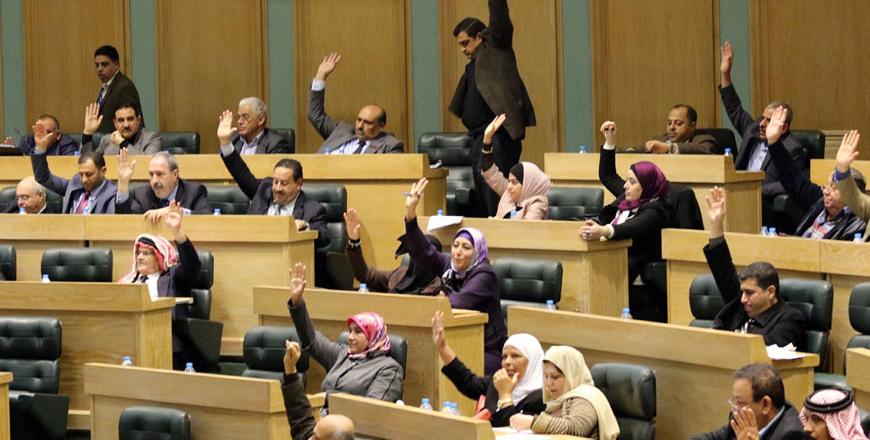You are here
By-law guarantees transparency, voter rights — IEC
By Dana Al Emam - May 21,2016 - Last updated at May 21,2016
AMMAN — The draft electoral constituency by-law, which is expected to be finalised this week, seeks to improve the electoral process and enhance transparency, President of the Independent Elections Commission (IEC) Khaled Kalaldeh said on Saturday.
He added during a panel discussion of the by-law, which was open to public comments and suggestions on the commission's website and is still under study, that the new regulation divides the country into three districts (northern, central and southern) to facilitate the process of extracting results.
Under the regulation, after the vote count of each ballot box, the results will be displayed at the door of the voting room and submitted to observers and media outlets. The results of all the eight or 10 voting rooms in the ballot centre are then added up and the original result cards of all ballot boxes will be submitted to the electoral committee in charge.
This move allows direct reporting of the results to observers and media outlets, helps the electoral committee deal with fewer result cards and facilitates the process of looking into objections as the commission will only deal with the results of eight or 10 cards, rather than those of 300 ballots, he said.
The draft bill introduces measures that ensure the voting inclusiveness, he said, explaining that if the ballot was damaged before the voter fills it, it would be replaced. Previously, that was not possible.
The proposed regulation obliges voters to dip their left indexes in ink after voting, while it was optional in the previous regulations.
Furthermore, the new rules allow the elderly, people with special needs and the illiterate to have a companion, under the condition that the companion would dip his/her right index in the elections ink, according to Kalaldeh.
Former senate president, Taher Masri, who also spoke at the panel organised by the Jordan Transparency Association, highlighted the need for the on-ground practices regarding elections to be in harmony with IEC’s measures to enhance transparency of the electoral process.
By achieving this harmony in the upcoming elections, authorities might “regain” public trust in the integrity of the electoral process and results of the elections, he said, adding that violations that occurred in pervious parliamentary elections are “no secret to Jordanians”.
Ensuring the transparency of the upcoming parliamentary elections will help Jordan move towards building the state instead of building authority, which some previous elections contributed to, Masri said.
Meanwhile, he suggested adding a legal article that punishes violators of the regulations governing the electoral process, adding that such penalties must be coupled with political willingness to achieve reform and entrench the rule of law.
The upcoming elections are hoped to result in a parliament that is “more representative of Jordanians across the political spectrum”, said Amer Bani Amer, director general of Al Hayat Centre for Civil Society Development, which runs Rased, a parliament and elected councils’ performance watchdog.
The fact that some political groups boycotted the previous parliamentary elections has pushed authorities to increase participation rates and to deliberately “overlook” some violations, according to Bani Amer.
He added that the draft by-law should clarify some grey areas in the Elections Law that may cause conflicts on Election Day, especially issues related to vote count.
Meanwhile, he cited a need to set a ceiling for the amount of money that candidates pay in their campaigns, which in some cases reached JD1 million, adding that it is “indirect” black money.
The 2015 Elections Law, which was endorsed last month, is based on an at-large voting system, in which candidates can run for parliamentary elections on one large multimember ticket.
The bill divides the Kingdom into 23 electoral districts, one for each of the 12 governorates, except for Amman which was split into five districts, Irbid into four and Zarqa into two.
Each of the three badia districts (northern, central and southern) is considered a governorate for the purposes of the bill, a key component of the country’s political reform process.
The draft law allocates 115 seats for the constituencies and 15 seats for women’s quota, one seat for each governorate and one seat for each of the three badia districts.
The draft law also stipulates that the ticket includes no less than three candidates and does not exceed the number of seats allocated for the constituency in which the ticket is competing.
Under the bill, each eligible voter can only pick one list and has then to name the candidate(s) he/she has chosen from the ticket.
Related Articles
AMMAN — A Royal Decree was issued on Sunday endorsing the 2015 Elections Law, the Jordan News Agency, Petra, reported.The two Houses of Parl
AMMAN — The Lower House on Monday approved 46 out of the 68 articles of the draft elections law, including a provision stipulating the open
AMMAN — The Lower House on Tuesday passed the draft 2015 parliamentary elections law with minor changes following six marathon sessions that













